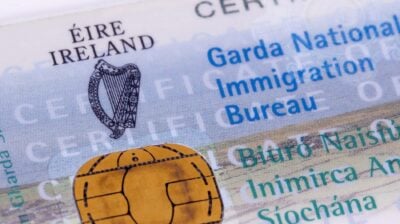Regularisation scheme for undocumented migrants in Ireland
This scheme allows some undocumented migrants to apply for legal residence in Ireland. Find out who can apply and how it works.

The Government has introduced a scheme that allows long-term undocumented migrants to apply for legal residence in Ireland. This opportunity will be available to those who meet the criteria outlined below. There is a separate strand for people seeking asylum in the International Protection process.
Before you apply, it’s important to first check that you are definitely eligible for the scheme, and then to make sure you have all of your documents. If you do not meet the criteria, you are not eligible to apply for this scheme and if you do apply, it could put you at risk. If you’re not sure if you’re eligible, you can contact several organisations for free and confidential support services about the scheme. See more information below.
The scheme for undocumented migrants will close on 31 July 2022. You must apply before this date.
A separate strand for people seeking asylum in International Protection is also available until 7 August 2022. Find out about applying for the International Protection Strand.
What is the Regularisation of Long Term Undocumented Migrant Scheme?
This scheme is open to some undocumented migrants to allow them to ‘regularise’ their status in Ireland, which means they will no longer be undocumented. If your application is approved, you will get Stamp 4 residence permission.
There is a separate application process for asylum seekers. If you are applying for or you are already in the International Protection, find information on applying for this strand here.
Who can apply for the scheme?
You are considered undocumented if you are from outside of the EU or EEA, and you do not have permission to be in Ireland. This could be because you once had permission to be resident in Ireland but it expired, or you never had legal residence in Ireland.
Undocumented people who meet the undocumented residence requirement and other necessary criteria can apply for the scheme include:
- People who’ve been undocumented in Ireland for four or more years or three or more years if you have children under the age of 18 in Ireland.
- People with an existing Deportation Order who also meet the undocumented residence requirement
- People with an Application under Section 3 who also meet the undocumented residence requirement
- The residence requirement must be reached by the opening of the scheme (January 31st)
If you left Ireland at any stage over the 3-4 years, you can still apply provided you were not out of the country for more than 60 days.
There are some undocumented migrants who will not be able to apply for this scheme because they don’t meet the criteria. It’s best not to apply if you’re not eligible, as it could put you at risk. There are several organisations that you can contact, like the MRCI for support, or for information on other options that you may have to regularise your residence status in Ireland.
Can I apply if I have a criminal record?
You must declare all criminal convictions when you apply.
If you have been convicted of a minor criminal offence, you can still apply and you are unlikely to be refused because of this.
The scheme will require you to be of ‘good character’ which means that if you do not have a criminal conviction but there are other issues like domestic violence or barring orders in your history, you may be refused.
If you have been convicted of a serious criminal offence, you will most likely be refused.
How to apply for the regularisation scheme
Applications will be open from 31 January 2022 until 31 July 2022.
Undocumented migrants must apply online, and you will need to provide documents including proof of identity and residence history.
There is a separate process for those currently in the International Protection process.
Take your time with your application and make sure that you have all the relevant documents and information required. If you need advice or support, get in touch with one of the organisations at the end of this page for support and information.
Documents
The documents you need to provide include:
- Proof of identify (this can be a valid or expired document), one document per applicant or family member
- Residency documentation including at least one document for each year you were living undocumented in Ireland
- Evidence of relationship between applicants on a family application, including a marriage certificate or civil partnership certificate from Ireland or abroad, or proof that you have been in a relationship and living together for more than two years, and birth certificates for any children.
You can find full details and a non-exhaustive list of suggested accepted documents on the Department of Justice website.
You must also pay a non-refundable fee, in full, when you submit your application:
- €550 for an individual
- €700 for a family
What should I do if I don’t meet the criteria?
If you don’t meet the criteria for this scheme, then your application will be refused. Find out more about what you can do if your application is refused below.
It is recommended that you speak to the MRCI or another support organisation before applying if you don’t fulfil all the criteria, because you could put yourself at risk by applying without being eligible.
What happens if my application is approved?
If your application is approved, you will receive a letter granting you permission to stay in Ireland for two years on Stamp 4 conditions, which you can then renew. If you applied as a family, each member will receive their own letter.
You must register your permission with the Irish immigration authorities and be issued your Irish Residence Permit. Currently, children under the age of 16 do not need to register but they will then need to register when they turn 16 years old, unless they were born in Ireland.
What can I do with a Stamp 4 Residence Permit?
With a Stamp 4 Residence Permit, you can:
- Work in any job
- Travel home for a short time and return to Ireland
- Apply for family reunification with family members not currently living in Ireland. Such applications are considered on a discretionary basis.
- Renew your residence permit after two years
- Your residence period can count towards the required period of residence to be eligible to apply for Irish citizenship
What happens if my application is refused?
If you are refused, you will receive a letter outlining why this decision was made. Your application could be refused because:
- You did not meet all of the criteria
- You didn’t provide enough information or there were inconsistencies in the information you provided
- There was false or misleading information provided
If you believe your application should have been accepted, you can appeal the decision.
How to appeal the decision
If you want to appeal, you must do this within 30 days of your application being refused. You can lodge your appeal through the Immigration Service portal.
If your appeal is successful, you will receive a letter granting you permission to stay in Ireland. You can then follow the steps above.
If your appeal is unsuccessful, they will refer your case to the Repatriation Unit.
If you were in the process of another application for residency or for International Protection, those applications will still be processed even if you are refused for this scheme.
Who can I go to for help with this scheme?
Some people may be feeling nervous about applying for this scheme. If you fulfil all of the criteria, it is safe to apply. There are a number of organisations who can offer advice and support to those interested in applying.
Migrant Rights Centre Ireland
You can get help and support from the Migrant Rights Centre Ireland, who can guide you through the application process, and sign up to attend a clinic for additional supports. There is a dedicated web page with all the relevant and up-to-date on the scheme
It is also best to speak to MRCI if you are not sure whether you are eligible. Applying for this scheme without fulfilling all of the criteria could put you at risk.
You can get in touch with a case worker through the MRCI website, or by emailing [email protected].
Immigrant Council of Ireland
The Immigrant Council of Ireland has a helpline where you can ask questions and be supported with the application process. The staff may be able to assist you to make an application or refer you internally to the Law Centre if that is necessary.
Nasc, the Migrant and Refugee Rights Centre
Nasc works with migrants and refugees to help them understand their rights. If you have questions about this regularisation scheme, you can contact the NASC Advocacy service.
Free Legal Advice and Care (FLAC)
The FLAC Helpline is there to answer questions and provide basic legal information to the public. If you have questions about the scheme, FLAC may be able to offer information.






